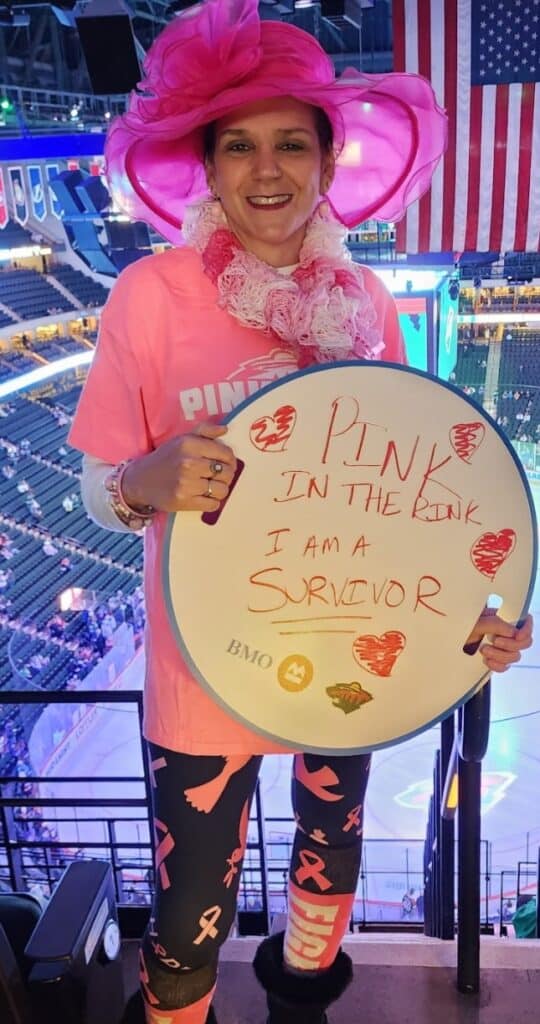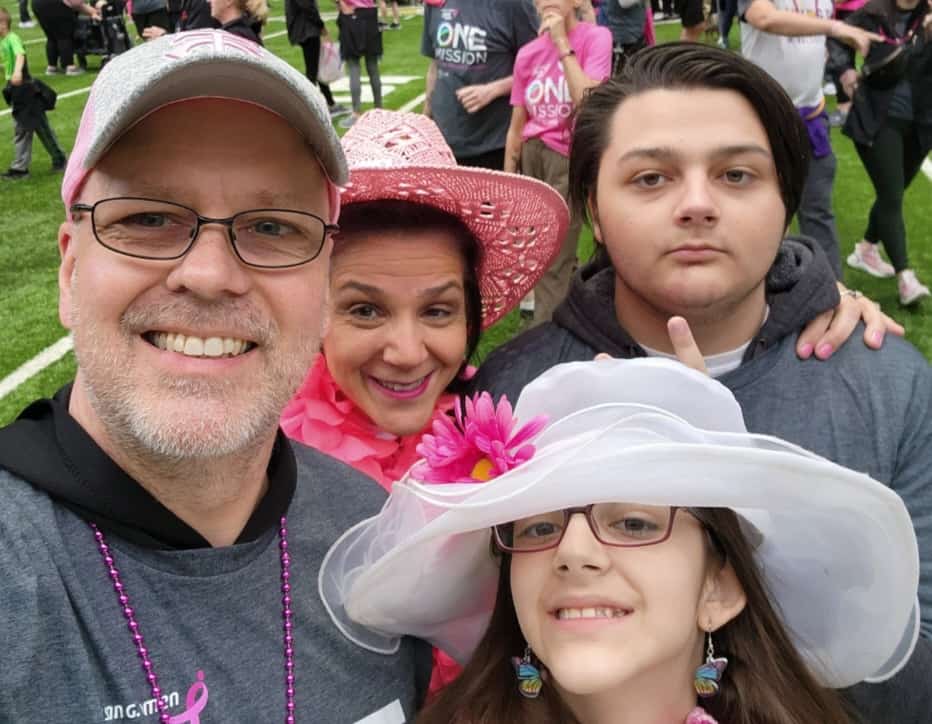
Christina Bemis has undergone treatment for breast cancer twice. She was always worried she might be at risk of developing breast cancer because of her family history. This is her story in her own words.
As a two-time survivor of breast cancer, I cannot stress enough how important it is to be confident and comfortable with the treatment decisions you make, the importance of finding a team or doctors who are right for you and having support throughout your journey with breast cancer.
My first diagnosis was in January 2015 at age 42. I had a standard mammogram in December 2014, and nothing showed up. Then in early January I found a lump right before I was going in for my annual exam. My OBGYN said let’s check it out just to be safe. I was trying to be optimistic, but I was really scared and cried through the whole biopsy. There is a history of breast cancer on both sides of my family and ovarian cancer on my dad’s side.
I got the results the next day after work, right before I was going to get my kids from the bus stop. I was told over the phone I had breast cancer. I felt like I couldn’t tell my kids because they were very young, just 7 and 5. I had to keep it together while I got them from the bus stop. After I got the kids, I called Michael, my then boyfriend and now husband. He went silent when I told him. He didn’t know what to say.
Medically, the ball started rolling immediately after my diagnosis of stage 1A breast cancer. It was a whirlwind. I had to see a surgeon and a plastic surgeon and had a breast MRI. My surgeon recommended a double mastectomy because of my family history, even though luckily it was just in one breast. I did have genetic testing for BRCA 1 and BRCA 2 gene mutations and tested negative for both.
I had to wait over a month after diagnosis to do the double mastectomy with reconstruction. I was scared the whole time and didn’t tell the kids anything until I was close to my surgery and had the facts. When I told them, they were scared too.
My oncologist told me there was only a 3% chance the cancer would come back, so she didn’t recommend any tumor marker testing, follow up scans, radiation or chemotherapy. The recovery from surgery and reconstruction was long, and I had to have physical therapy. It was really challenging for me. I’m a person who wants to do things myself. I just want to do and do and do. With support, I made it through the recovery and went back to work in April.
But it wasn’t over.
In January 2017, I found another lump, hiding behind my implant. I went into the surgeon. A breast ultrasound showed a mass in my right breast. I was told I needed to see my plastic surgeon. He was amazing. He did the biopsy. The spot was really small. It looked like an ugly black pea. I was told there was a 50/50 chance it was scar tissue or cancer. I wasn’t worried about the results because I had been told there was a 3% chance of recurrence.
The day I went back to my surgeon to get my results, I was planning on going to lunch after the appointment with Michael. But when I got to the surgeon’s office, she pulled her chair really close and told me the cancer was back. I had a recurrence and it was stage 1A breast cancer in my right breast. I hadn’t brought anyone with me because I thought it was going to be scar tissue, not cancer again.
I didn’t feel like I had proper care before from my first oncologist, so I wanted a new one. My new oncologist was a recommendation from a support group, and he is amazing. I trust him. I get blood work three times a year and a yearly CT scan done. I get a lot of anxiety each time I have to go back in and get checked.
My treatment the second time around was 34 rounds of radiation. It was really painful. Radiation tightens the skin, so my plastic surgeon had to make cosmetic adjustments. I also had my fallopian tubes and ovaries removed as well, just to be safe, and that put me in early menopause.

Get your yearly mammograms – early detection is crucial. Make sure you’re comfortable with your doctors. Have people around who support you and take someone to your appointments because you will be overwhelmed. And join a support group after diagnosis. You are thrown into a whirlwind when you are diagnosed and then it’s suddenly like okay, now go on with your life, but you have all these emotions to deal with. I have met so many amazing women who support me and truly understand me.
Every day is a gift, every birthday is a gift. It’s been a blessing to see my kids grow up and being with family is a gift for me. I look forward to seeing my kids grow, graduate and blossom into who they will become – and to live in the moment.
Click here to learn more about breast cancer risk.
Statements and opinions expressed are that of the individual and do not express the views or opinions of Susan G. Komen. This information is being provided for educational purposes only and is not to be construed as medical advice. Persons with breast cancer should consult their healthcare provider with specific questions or concerns about their treatment.



